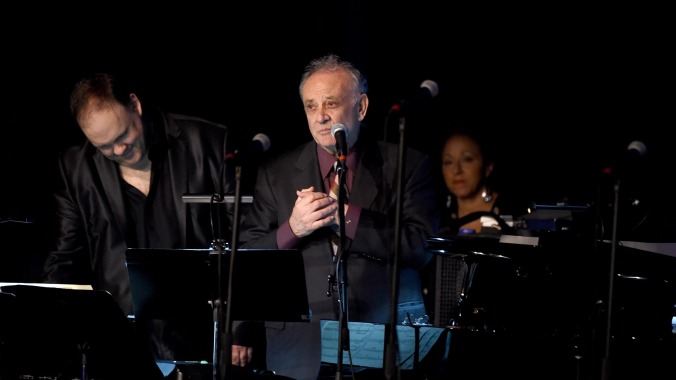R.I.P. Angelo Badalamenti, composer and frequent David Lynch collaborator
Angelo Badalamenti, the composer behind Twin Peaks' iconic and haunting score, has died

Angelo Badalamenti, the composer who won a Grammy for his iconic, haunting work on Twin Peaks and who regularly worked with David Lynch both before and after, has died. This comes from The Hollywood Reporter, which says the news was confirmed by the composer’s family, but a specific cause of death was not given. Badalamenti was 85.
Born in Brooklyn in 1937, Badalamenti started playing piano as a child and later earned a full scholarship to the Eastman School Of Music in Rochester, New York. He later received bachelor’s and master’s degrees from the Manhattan School Of Music, having spent his college years playing pianos at resorts in the Catskills, learning all of the old standards and becoming adept at various different styles of music.
He got a job as a professional composer in the ‘60s while teaching music at a junior high school, with a local PBS station airing a Christmas musical that he had composed for his students. He worked with artists like Shirley Bassey, Nina Simone, Nancy Wilson, and more before doing his first film scores: Gordons War in 1973 and Law And Disorder a year later. He didn’t do another movie until 1986, when he was asked to serve as Isabella Rossellini’s vocal coach on the film Blue Velvet (he also makes a cameo as a piano player in the movie).
When director David Lynch couldn’t get the rights to a song he wanted for the film, he and Badalamenti wrote their own track, “Mysteries Of Love,” which was sung by Julee Cruise and kicked off a string of collaborations between the three of them. Badalamenti scored A Nightmare On Elm Street 3 and National Lampoon’s Christmas Vacation before reuniting with Lynch and Cruise for Twin Peaks, Lynch and co-creator Mark Frost’s legendary horror/drama/mystery series from 1990.
Badalamenti had said that he scored most of the pilot for Twin Peaks without ever seeing any footage. He simply sat at his piano and listened to Lynch describe his ideas for the show while coming up with music to accompany Lynch’s vision, as he explained in this beautiful video included on one of the Twin Peaks DVD sets:
An instrumental version of Julee Cruise’s “Falling,” written by Badalamenti and Lynch, was used as the theme song for Twin Peaks and won a Grammy. Cruise, who died earlier this year, made several cameos on the show and its prequel/sequel Fire Walk With Me. Badalamenti’s moody music, meanwhile, is as much a part of the show’s DNA as anything else—be it the central mystery, the unforgettable imagery, or the beloved-yet-inexplicable tonal shifts. Lynch and Badalamenti would also work together on Wild At Heart, Lost Highway, The Straight Story, Mulholland Drive (in which Badalamenti also makes a cameo), short-lived HBO project Hotel Room, and Showtime’s Twin Peaks revival series (which featured new and old compositions from Badalamenti. In what was perhaps a nod to Badalamenti’s death, the ever-enigmatic Lynch noted in his regular weather report on YouTube today that there would be “…no music,” followed by a long pause.
Outside of his iconic work with Lynch, Badalamenti also worked with Paul Schrader (on The Comfort Of Strangers, Forever Mine, Auto Focus, and Dominion), Jean-Pierre Jeunet (The City Of Lost Children and A Very Long Engagement), Jane Campion (Holy Smoke), and Danny Boyle (The Beach). He also worked on the score to surprise hit Quantic Dream video game Indigo Prophecy in 2005. Badalamenti received a lifetime achievement award from the World Soundtrack Awards in 2008 and the Henry Mancini Award from ASCAP in 2011. He is survived by his wife and daughter.